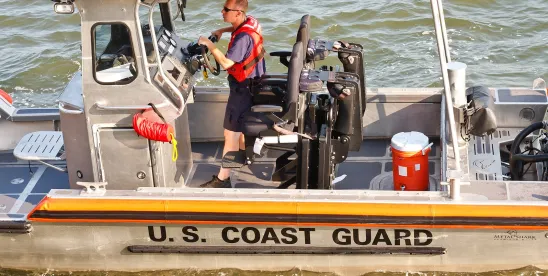The U.S. Coast Guard (“USCG”) last week published a Request for Information (“Request”) in the Federal Register (89 Fed. Reg. 48515) seeking information on the monitoring, recordkeeping, and reporting procedures under the U.S. Environmental Protection Agency’s (“EPA”) Vessel General Permit (“VGP”) and the USCG’s ballast water management requirements. With the USCG’s inquiry focused on the resources devoted per vessel to compliance requirements, the USCG plans to use the information provided to “evaluate new and updated solutions that inform data-driven policymaking, reduce the reporting and record-keeping burden on industry, and confirm environmental compliance.” While not stated explicitly, the Request is clearly a precursor to the USCG’s development of a proposed rule pursuant to the Vessel Incidental Discharge Act (“VIDA”). Comments are due by July 22, 2024.
Interested parties are encouraged to review the Request carefully and provide their insights, either individually or through trade associations, prior to the July 22, 2024, deadline as this Request is a critical precursor to implementation of VIDA.
Background
2013 Vessel General Permit. The VGP was issued under the Clean Water Act’s (“CWA”) National Pollutant Discharge Elimination System program and provides permit coverage nationwide for discharges incidental to the normal operation of commercial vessels more than 79 feet in length. EPA issued the first version of the VGP in 2008 and then another, more stringent, version in 2013. The VGP set effluent limits and mandated Best Management Practices to control certain types of incidental discharges. It also required vessels to conduct routine and annual inspections and imposed numerous recordkeeping obligations, as well as monitoring and reporting requirements.
USCG Ballast Water Management. The USCG published a final rule addressing ballast water management, which became effective in June 2012. These regulations, codified in 33 C.F.R. Part 151, mandate ballast water management requirements, including type-approved ballast water management systems. They further outline required Best Management Practices and monitoring, recordkeeping, and reporting requirements.
Vessel Incidental Discharge Act. In December 2018, VIDA was signed into law and intended to replace the VGP to bring uniformity, consistency, and certainty to the regulation of incidental discharges from U.S. and foreign-flag vessels. VIDA amended the CWA and will substantially alter how EPA and the USCG regulate vessel discharges. VIDA required EPA to finalize uniform performance standards for each type of incidental discharge by December 2020, a deadline that the EPA has missed by more than three years, and requires the USCG to implement EPA’s final standards within two years thereafter.
The USCG’s Request
The USCG requests information, comments, and suggestions about “the convenience, costs, time spent, content, applicability, and functionality of the current EPA and USCG monitoring, recordkeeping, and reporting procedures.” The USCG’s goal is to identify opportunities to streamline any future USCG monitoring, recordkeeping, and reporting requirements, particularly with respect to the electronic recordkeeping and reporting systems used—i.e., those the USCG must implement pursuant to VIDA.
The USCG specifically seeks comments on four areas:
- Generally, the amount of time and resources needed per vessel to comply with VGP and USCG ballast water related monitoring, recordkeeping, and reporting requirements.
- The form and usability of reporting forms and electronic Notice of Intent forms.
- The quality of the instructions on the various reporting forms, usability of the VGP reporting system and software, and information on how vessel data is compiled, including any other software being used to compile compliance data.
- Experiences with submitting National Ballast Information Clearinghouse reports and VGP Annual Reports.
Further details on the types of information the USCG is seeking are available at Regulations.gov.





 />i
/>i

